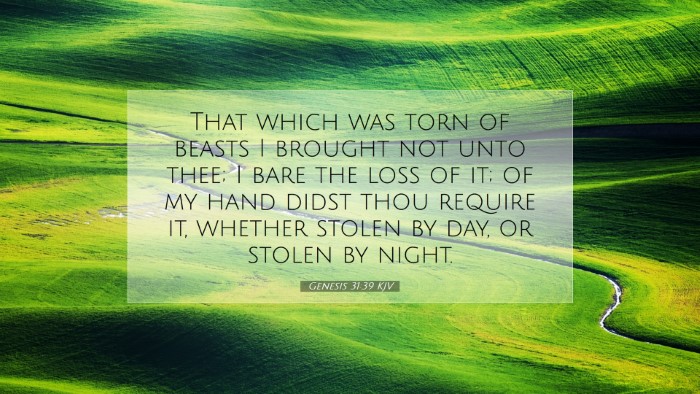Commentary on Genesis 31:39
Verse Context: Genesis 31:39 states, “That which was torn of beasts I brought not unto thee; I bare the loss of it; of my hand didst thou require it.” This verse occurs during a critical moment in Jacob's narrative, as he addresses Laban regarding his service and the burdens he carried as a shepherd.
Overview
This verse encapsulates themes of responsibility, integrity, and the trials of labor. Jacob’s testimony reveals his dedication as a servant, emphasizing that he bore losses and hardships without complaint. He contrasts his diligent stewardship with Laban's expectations and reveals the dynamics of their relationship.
Thematic Insights
- Stewardship and Responsibility:
Jacob’s actions demonstrate a model of stewardship. As a shepherd, he cared for Laban’s flock with utmost dedication, illustrating a responsibility that is commendable. This aspect aligns with the biblical context that calls for leaders to be faithful in their duties.
- Integrity in Service:
Jacob highlights the integrity of his service by recounting his sacrifices. His assertion that he did not bring torn animals to Laban signifies his unwillingness to exploit circumstances for personal gain, an integrity that resonates with the ethical teachings of scripture.
- The Burden of Labor:
The verse underlines the challenges that often accompany honest labor. Jacob bore the losses personally, reflecting the high cost of commitment and the struggles inherent in working for another. This theme encourages consideration of the hardships faced by those in ministry and service.
Commentary Highlights
Insights from Matthew Henry
Matthew Henry emphasizes Jacob's exemplary behavior in this passage. He notes that Jacob’s long years of service were marked by personal sacrifice and resilience. Henry illustrates how Jacob’s personal loss was born out of respect for Laban's property, indicating a profound moral lesson on integrity and the value of honest work.
Insights from Albert Barnes
Albert Barnes provides critical insights into the implications of this verse regarding the expectations of employers versus the endeavors of employees. He focuses on Jacob's explanation of the barriers he faced and how they shaped his relationship with Laban. Barnes remarks that Jacob's commitment was not only to the work itself but also to maintaining ethical standards within a challenging environment.
Insights from Adam Clarke
Adam Clarke delves into the nature of the losses Jacob incurred, noting how they reflect the broader human experience of working under difficult circumstances. Clarke highlights the lesson of accountability, stressing that Jacob's honesty and transparency stand in stark contrast to Laban's exploitative tendencies. Clarke emphasizes that believers are called to model integrity even in adverse situations.
Theological Implications
This verse invites reflection on how believers today can embody the virtues demonstrated by Jacob. The broader theological implications relate to how integrity in stewardship and commitment to ethical conduct is foundational to Christian character. Furthermore, it challenges leaders in various capacities to uphold accountability and diligence in their service.
Practical Applications
- Reflect on Personal Integrity:
Believers are encouraged to evaluate their own work ethics and ensure they align with biblical principles.
- Encourage Accountability:
Leaders should foster environments where accountability is valued, ensuring that others are recognized for their diligence and honesty.
- Support and Uplift Others:
Those in positions of influence should actively support those laboring faithfully in ministry and work, understanding the sacrifices made behind the scenes.
Conclusion
Genesis 31:39 serves as a profound reminder of the qualities of dedication, integrity, and personal sacrifice depicted in Jacob's relationship with Laban. Through the lens of historical and theological reflection, this verse invites modern believers, scholars, and leaders to embrace these virtues within their own contexts. As they embody these principles, they reflect the heart of God's call towards faithful stewardship and ethical living.


